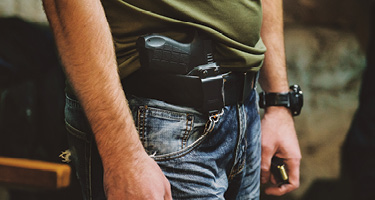The tragic mass shooting that claimed the lives of 18 individuals in the college town of Lewiston, Maine, last October has since sparked intense scrutiny regarding the state's approach to gun legislation. Concerns have been raised about Maine's comparatively relaxed stance on gun regulations, particularly in the area, and the critical absence of red flag laws. These laws, now implemented in over 20 states, primarily in New England, are designed to prevent individuals deemed high-risk or potentially dangerous from accessing firearms. Legal experts and critics alike have underscored the urgency of reevaluating Maine's current policies in light of this devastating event.
What Maine does have, instead, are yellow flag laws, which were written and enacted in 2019 with the help of several gun rights and advocacy groups, as initially reported by the Associated Press. Currently, Maine is the only state with a so-called yellow flag law. But how much do they differ from red flag laws, and how does Maine's gun legislation stack up against the rest of New England?
Maine’s Current Firearm Legislation
Maine's yellow flag laws function similarly to red flag laws, albeit with an additional procedural step for confiscating firearms from individuals deemed highly dangerous or at risk to themselves or others. Under the yellow flag law, a law enforcement officer must report the potential confiscation of a person's weapon to an administrative judge, resulting in a medical professional conducting a mental health evaluation of the individual in question. In contrast, red flag laws typically involve either law enforcement or a family member petitioning a judge without requiring a medical review.
Sam Levy, legal director of Everytown, a nonprofit gun reform group, expressed his discontent and overall disappointment in Maine's current firearm legislation, stating that it made it exceptionally challenging to intervene in crises and find available mental health professionals to evaluate gun owners properly. "They have had a quantum leap regarding their approach to gun safety. Since 2018, they've passed a slate of bills that gave them many of the foundational laws that are so common in New England," stated Levy, as reported by the Associated Press.
Conversely, Jack McDevitt, a professor at Northeastern University's School of Criminology and Criminal Justice, heavily emphasized the importance of highlighting individuals close to those at risk since they are usually best positioned to recognize early signs of distress and intervene appropriately. "In Maine and even other states in New England, we see a culture where people are more likely to think that everyone should have easy access to a firearm if they want it," stated McDevitt.
That said, Maine has remained a permit-less carry state since 2015, allowing individuals aged 21 and older, or 18 and older if currently on active military status, to conceal carry without a permit. However, this leniency in gun restrictions has likely contributed to the state receiving a failing grade from the Giffords Law Center, a notable advocacy group that evaluates and measures the safety of states' gun laws.
How Do New England’s Laws Compare?
With only one exception, most of New England has stricter gun laws in place—and a different gun culture altogether.
For instance, New Hampshire, the only other New England state to receive an F on the Giffords scorecard, has relatively limited gun control laws. New Hampshire mainly lacks legislation like a red flag law and allows carrying firearms without a permit, not at all unlike Maine.
Age restriction only applies to handgun ownership, requiring individuals to be at least 18 years old. Vermont, on the other hand, has recently implemented several new gun laws, including a red flag law, in response to the high rate of suicides involving firearms. Additionally, Vermont bans high-capacity magazines, requires handgun purchasers to be 21 or older and mandates federal background checks for all gun transactions. Despite these restrictions, permit-less carry is still accepted.
Massachusetts, Connecticut, and, to some extent, Rhode Island surpass their New England counterparts to the north by implementing red flag laws, background checks for gun purchases and prohibiting high-capacity magazines. Massachusetts and Connecticut even go further by outlawing certain semi-automatic weapons and requiring that gun owners store their firearms securely when not in use. Connecticut and Rhode Island have also placed restrictions on ghost guns, which are untraceable firearms manufactured privately.
U.S. Senators Susan Collins and Angus King, both representing Maine, recently stated they support fully banning high-capacity magazines but not assault-style weapons. These developments have arrived on the heels of one Maine legislator, Jared Golden, who stated that the Lewiston shooting actually reversed his decision to support an assault weapons ban. Moving forward, it’s unclear which legislative direction the state will choose to take.
For readers seeking legal guidance on firearm regulations or related issues, the Best Lawyers Find a Lawyer tool is available to help you review top-rated lawyers in your area.






























